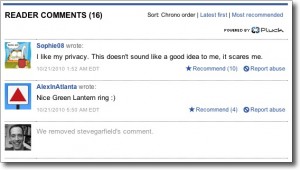Online comments are being shut down
 One by one, news sites are changing how they deal with reader comments below online articles. Some are choosing to shut down online comments completely. Others have assigned members of staff the task of strictly moderating comments left by readers, and deleting ones deemed inappropriate. And some have begun outsourcing comments all together to social media sites like Facebook.
One by one, news sites are changing how they deal with reader comments below online articles. Some are choosing to shut down online comments completely. Others have assigned members of staff the task of strictly moderating comments left by readers, and deleting ones deemed inappropriate. And some have begun outsourcing comments all together to social media sites like Facebook.
But hang on, don’t editors appreciate reader participation anymore? Well, it seems they do, but they’re tired of combatting racist and sexist comments, vulgar allusions and off-topic discussions that don’t offer any insight or value to other readers (or so they say).
The Reuters news agency has probably taken the most radical path. On its English-language website, readers can no longer post comments under news articles; commenting is confined to opinion pieces only.
“Readers can join the conversation about all Reuters journalism on Facebook (…) or on Twitter,” said Reuters Digital’s Executive Editor Dan Colarusso in November – in other words: go somewhere else and don’t bother us with your comments.
The magazine Popular Science has made a similar decision: “Because comment sections tend to be a grotesque reflection of the media culture surrounding them, the cynical work of undermining bedrock scientific doctrine is now being done beneath our own stories,” wrote the magazine’s online content director Suzanne LaBarre in a move to explain the decision to completely shut off the comment function.
Others have taken to strictly moderating their comment sections: “We have a team that takes care of moderating comments almost day and night,” said Jochen Wegner, editor-in-chief of the German news platform Zeit Online, in an interview with the German online site Meedia). Wegner said he doesn’t want to do away with comments all together or put an end to anonymous commenting in an attempt to stop bad behavior. Zeit Online readers do have to register an account, but they can still post comments without disclosing their true identities. “This is very time consuming, but we think that one of the basic tasks of journalists is to allow for a free debate,” Wegner said.
 The New York Times has taken another path. It presents their readers with two options: they can either voluntarily disclose their identities by supplying their real names and verifying their accounts or keep posting anonymously. The so-called “trusted readers” will be able to post comments that will immediately be published, while everyone else’s contributions will be held for review by the editorial team before being made public.
The New York Times has taken another path. It presents their readers with two options: they can either voluntarily disclose their identities by supplying their real names and verifying their accounts or keep posting anonymously. The so-called “trusted readers” will be able to post comments that will immediately be published, while everyone else’s contributions will be held for review by the editorial team before being made public.
As mentioned, some media are trying to cultivate better conversations by outsourcing comments to social networks such as Facebook and Google+. The German daily Süddeutsche Zeitung is one of the latest examples. SZ has mostly banned comments on its own website. However, under each article there is a link asking readers to leave a comment on Facebook. To compensate for the lack of an in-house commenting system, the newspaper has introduced a moderated debate forum with strict rules on two to three selected topics every day.
Some news websites cooperate with Facebook even more closely than the Süddeutsche Zeitung, following the launch of a plugin in 2011 that allows them to embed Facebook comments on their own sites. An increasing number of news platforms choose to do so in an attempt to moderate online behavior.
The Huffington Post’s US website has revamped its commenting system twice in just a matter of months. After shutting down anonymous comments in 2013, it gave up its own commenting system altogether and decided to embed Facebook comments in 2014. Users now automatically comment via their Facebook profile, a solution that is convenient for most people as they already have a Facebook account. At the Huffington Post, the hope is that Facebook’s real-name policy will cut down on trolling, not to mention that the site can also expect improved traffic through the increased visibility Facebook offers.
Good idea to outsource?
However, there are quite a few valid arguments on why anonymous commenting should be continued and why outsourcing comments to social networks such as Facebook or Google+ may not be such a good idea.
 Firstly, there are groups of people for which a real-name policy could spell trouble. Just think of political dissidents and marginalized groups such as gays and lesbians. Would you post a comment under a controversial article if you were an opposition activist in China or a gay in Saudi Arabia?
Firstly, there are groups of people for which a real-name policy could spell trouble. Just think of political dissidents and marginalized groups such as gays and lesbians. Would you post a comment under a controversial article if you were an opposition activist in China or a gay in Saudi Arabia?
Secondly, people who have a job that is somehow related to politics might be obliged to refrain from commenting publicly on certain issues. There may also be security issues if you work in law enforcement, for example.
In addition, interacting with readers has become a crucial element of journalism. By outsourcing comments, you give that element away to companies like Facebook. Not only does someone else control how reader comments on your article look and function, you also forgo your right to set the standards that comments have to meet.
Finally, social networks such as Facebook do not just require real names to fight bad online behavior. The companies collect data in order to build a profile of a user for advertising and marketing purposes. Do news organizations really want to support that kind of data obsession?
Author: Jannis Hagmann, edited by Kyle James
Photos: Creative Commons (Rob McMahon BY-NC; nolievr28 BY-NC-SA; Steve Garfield BY-NC-SA)



